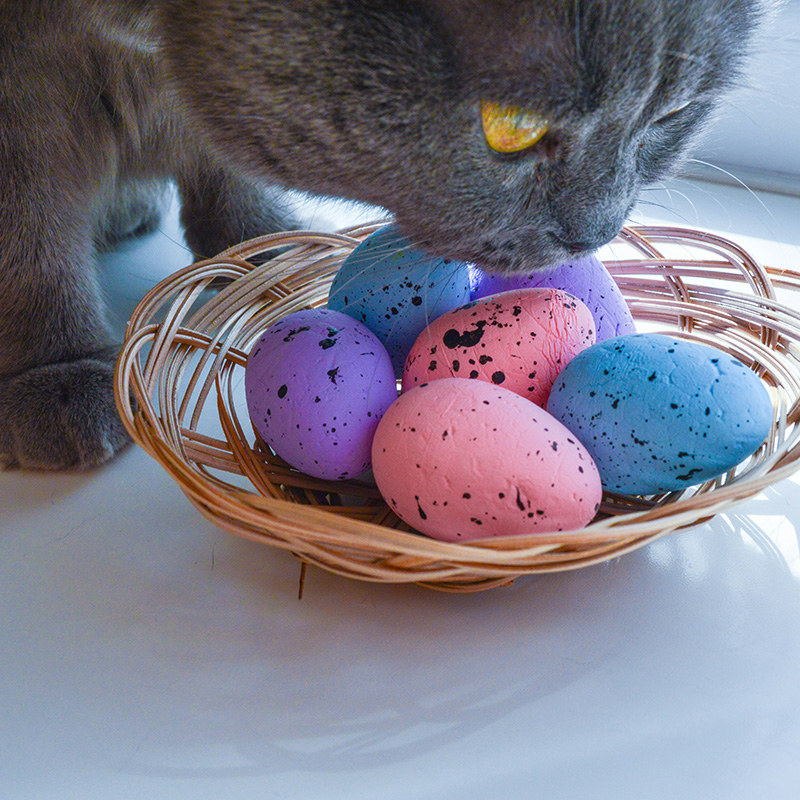Easter Safety Tips for Pet Owners
 With the Easter break fast approaching, many of us are looking forward to a well-earned rest, delicious seasonal treats, and time spent with family and friends. While it’s a joyful time for humans, it’s important to remember that some Easter traditions can pose risks to our beloved pets.
With the Easter break fast approaching, many of us are looking forward to a well-earned rest, delicious seasonal treats, and time spent with family and friends. While it’s a joyful time for humans, it’s important to remember that some Easter traditions can pose risks to our beloved pets.
To help you keep your furry friends safe and healthy this Easter, we’ve put together some essential safety tips every pet owner should know.
1. Keep Chocolate Well Out of Reach
Chocolate is a staple treat at Easter, but it’s one of the most common causes of poisoning in dogs. Chocolate contains theobromine, which is toxic to dogs, cats and even rabbits. Dark chocolate poses the greatest risk, but milk chocolate can also be dangerous in large enough quantities.
Be sure to store all Easter eggs, chocolate bunnies, and sweet treats in cupboards or high shelves, well away from curious noses. Remind children and guests not to share their chocolate with pets, no matter how persuasive those puppy-dog eyes may be!
2. Watch Out for Hot Cross Buns
Hot cross buns may be a seasonal favourite, but they can be harmful to pets. Many contain raisins or sultanas, which are toxic to dogs and can cause kidney failure even in small amounts. The exact cause of this toxicity remains unknown, but the effects can be severe.
Keep baked goods stored safely, and if your pet manages to snatch a bun or any raisin-containing food, contact us immediately for advice.
3. Secure Your Easter Decorations
Easter decorations can be irresistible to playful pets, particularly cats and puppies. Items such as plastic grass in Easter baskets, small toys, ribbons and foil wrappers can be choking hazards or cause intestinal blockages if swallowed.
Try to decorate with pet-safe materials and supervise your pets around anything new or unusual. Always clean up promptly after any Easter activities or egg hunts to avoid accidents.
4. Be Cautious with Easter Flowers
Fresh flowers can brighten your home at Easter, but some popular spring blooms can be toxic to pets. Lilies, in particular, are extremely dangerous to cats—even a small amount of pollen or water from a vase can cause kidney failure.
Daffodils, tulips, and hyacinths are also potentially harmful if ingested. Keep any bouquets well out of reach, or opt for pet-friendly plants such as sunflowers or roses instead.
5. Mind the Easter Feast
If you’re hosting an Easter roast, be careful what scraps end up in the dog’s bowl. Fatty foods, bones, onions, garlic, and rich gravies can all lead to digestive upset or more serious conditions such as pancreatitis.
Stick to your pet’s normal diet over the Easter weekend and avoid feeding them from the table. If you’d like to treat them, look for specially made Easter pet treats or speak to us about healthy, safe options.
6. Travel with Pets in Mind
If you’re heading away for the Easter weekend and bringing your pet with you, make sure you’ve planned for their comfort and safety. Pack their essentials—including food, water, bedding, toys and any medications—and never leave pets unattended in a car, even on cooler spring days.
If your pet is staying at a boarding kennel or with a pet sitter, ensure their vaccinations are up to date and they’re microchipped with your current contact details.
Have a Happy and Safe Easter!
Easter is a wonderful time of celebration, and with a few simple precautions, it can be just as enjoyable for your pets. If you have any questions about Easter safety or if your pet gets into something they shouldn’t, don’t hesitate to contact our team. We’re here to help throughout the Easter break.
Wishing all our clients and their furry companions a safe and joyful Easter!
-
Previous
